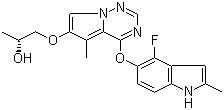
Cat No:LP000058
Product Name: DMXAA,AS1404,ASA404
CAS NO:649735-46-6
Molecular Formula:C19H19FN4O3
Molecular Weight:370.37800
Purity: ≥98%
Solubility: In DMSO
Storage: -10°C
Brivanib inhibits VEGFR1 and FGFR-1 with IC50 of 0.38 μM and 0.148 μM. Brivanib is not sensitive to PDGFRβ, EGFR, LCK, PKCα or JAK-3 with IC50 all above 1900 nM. Brivanib could inhibit the proliferation of VEGF-stimulated HUVECs with IC50 of 40 nM, compared to 276 nM in FGF-stimulated HUVECs. On the other hand, brivanib exhibits low activity to tumor cell lines[1]. Brivanib doses ≤20 µM paradoxically enhances FGF-induced LX-2 cell proliferation, whereas higher brivanib doses (≥30 µM) inhibits LX-2 cell proliferation. The inhibitory effect of brivanib on liver fibrosis is not through inhibition of TGF-β1-induced stellate cell activation, and is possibly through inhibition of PDGF-BB-induced stellate cell activation.
Brivanib displays antitumor activities in H3396 xenograft in athymic mice. At a dose of 60 and 90 mg/kg (p.o.), brivanib completely inhibits the tumor growth, with TGI of 85% and 97%, respectively[1]. Moreover, brivanib significantly suppresses tumor growth in Hepatocellular carcinoma (HCC) xenografts, which due to the decrease in phosphorylation of VEGFR2. The results show that the tumor weights in 06-0606 xenograft mice are 55% and 13%, compared with the controls at a dose of 50 mg/kg and 100 mg/kg. Brivanib is suggested to be efficient in treatment of HCC[2]. Brivanib (50 mg/kg, p.o.) attenuates liver fibrosis and stellate cell activation induced by BDL in mice. Brivanib inhibits growth factor and growth factor receptor mRNA expression in sham control animals but shows variable effects in bile duct ligated animals.
